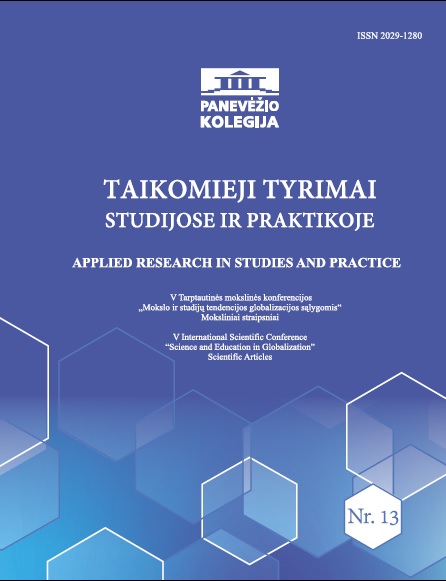GYVENTOJŲ PASITENKINIMAS GYVENIMO KOKYBE
CITIZENS‘ SATISFACTION OF THE LIFE QUALITY
Author(s): Rasa GLINSKIENĖ, Reda Jonušauskienė, Dalia URBONIENĖSubject(s): Public Administration, Sociology, Rural and urban sociology
Published by: Panevėžio kolegija
Keywords: life quality; administrative services; municipality; public opinion;
Summary/Abstract: Quality of life is a broad concept related to common well being of society. Researches related to measuring and evaluating quality of life have been started quite recently – in the middle of last century even though the concept of quality of life has been used before with different wording, for instance, satisfaction of life, happiness, prosperity and etc. Researches about quality of life have been started in order to understand personal and public welfare.Different evaluation methods of quality of life, satisfaction of life have been described for a long time in various scientific literature. It has to be noted that quality of life is not interpreted unambiguously and different authors choose different evaluation methods. Most of the authors (R. Lazutka, O. G. Rakauskienė, A. Sen) admits that GDP is not the only and main criterion showing well being of the country. Because of that there have been increasing number of attempts to better describe the concept of quality of life and improve its evaluation methods.Analysis of citizens of X region of Lithuania in writing answered questionnaire (of April, 2017) is presented in this article. The aim of the article was to evaluate public services users‘ satisfaction/dissatisfaction of those services. Using anonymous questionnaire respondents were able to judge initial indicators of public services and life quality. The public services for evaluation were all taken from local self-government functions described in the legislation of Republic of Lithuania, however there were some exceptions. The content of those public services included a variety of areas and sectors: communal economics, active leisure and sport, recreation, culture and etc. Administrative services were also reflect in the structure of questionnaire‘s indicators. At the end of each section of questionnaire respondents were asked to answer open questions meaning that they had to in their own words name the biggest problems that they are facing in local governments. The conducted research which was created to analyse public services, their quality, the work of mayor‘s institution and life quality of specific district gives a common understanding of underlying problems. Results are encouraging to continue conducting researches analysing citizens‘ satisfaction of public services in more details, for example, analysing them in different sectors. Another thing to be noted, that the abundance of social researches oriented to evaluate satisfaction level gives a way for more active democracy, more effective public relations management and increased quality of life Research showed that the X region mayor‘s work is appreciated by citizens. Citizens think that the most important ant mayor‘s functions are: help with citizens‘ problems related to public matters, creation of attractive city and region image as well as attraction of investments. According to the results of the research it is clear that X region citizens rarely use services of administration. Mostly services of utilities, environment cleaning, social and health care are used. The quality of those service have been evaluated satisfactorily. According to respondents to increase the quality of the public services effort should be put in decreasing bureaucracy, increasing competency of workers as well as improving service time. Respondents of X region claim that tangible, spiritual well-being, harmonious family life and environment have a huge impact on the quality of life. Correlation between before mentioned factors and problems mentioned by X region respondents is clear, while one of the biggest problem is difficulties to find a job (during a period of research 15 % of respondents have been looking for a job).When it comes to respondents‘ opinion towards cultural life in X region it has been revealed that the needs of citizens are met only partially. While trying to evaluate X region‘s cultural conditions it has been noticed that for 34 % of respondents it is difficult too perform an evaluation on that. On the other hand, 35 % of respondents claim that there is lack of attention give to development of X region‘s culture.
Journal: Taikomieji tyrimai studijose ir praktikoje
- Issue Year: 13/2017
- Issue No: 1
- Page Range: 85-93
- Page Count: 9
- Language: Lithuanian

